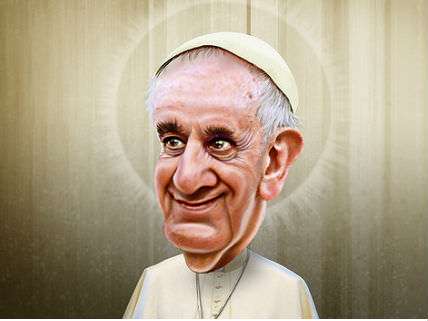Sorry, Pope Francis: Poverty, Not Inequality, Is the Source of Social Evil
Inequality in poor countries is much worse than inequality in rich countries

Conservatives are upset that Pope Francis' recent tweet "inequality is the root of social evil" was meant as a nod to French economist Tom Piketty's 500-plus page controversial bestseller, Capital in the Twenty-First Century, which warns that Western capitalist countries are headed for ever-widening inequality.
That the Pope is on Piketty's side is hardly a revelation given that he has previously blamed "unfettered" capitalism for perpetuating oppression, tyranny and every other ill on God's great planet. But he was wrong then, and wrong now.
Setting aside the irony that this sweeping condemnation of inequality is being issued by the head of the most hierarchical organization in the world, there isn't much empirical evidence for the Pope's claims.
For example, the rap against rising inequality is that it retards economic growth and leads to bad health and social outcomes for the poor. But Harvard University's Christopher Jencks found little impact of inequality on the poor's: standard of living; life expectancy; violent crime; political participation; or even happiness.
Consumers in America, the most unequal of all Western countries, he found, "do better than their counterparts in other large democracies."
Indeed, after looking for all the ills that liberals attribute to rising inequality in Western countries for over a decade, he has come up with so little that he has abandoned his book plans. (He told New York Times' Eduardo Porter last week, he feared headlines like, "Professor Doesn't Know What he is Talking About.")
Jencks' findings sound counter intuitive, but they aren't. Why? Because the real issue is not inequality but poverty: If the rising income gap between the rich and the poor stemmed from the poor losing ground, Jencks would have found the dreaded ill effects. But even Piketty doesn't claim that the poor are getting poorer in America or the West—only that the rich are getting richer faster. He expects this trend to grow because advanced capitalist economies offer bigger returns on capital investments (rich people's main asset), over labor (poor people's main asset).
But even if inequality due to the rising income of the rich doesn't affect economic and social outcomes of the poor, it is still possible that it is inherently corrupting for society. That's because the rich can be arrogant jerks. Being vastly better off makes them feel that they are better: smarter, more talented, more virtuous and therefore more entitled. Such attitudes erode social bonds and trust and produce resentments.
Indeed, research by University of California's Paul Piff found just that last year. He conducted lab experiments in which rich people consistently demonstrated an "empathy gap." Even when their wealth resulted from pure chance, they became less generous and ethical.
That might be true. But my experience with rich people in a rich country like America and rich people in a poor country like my native India suggests that India's rich are bigger jerks than America's on all those counts. Whereas in America, expensive cars and designer clothes define a rich person's style, in India they define his status and worth. India's wealthy classes are far likelier to blame not the system and its lack of opportunities for rampant poverty, but the poor themselves. Conversely, they are more likely to attribute their success to their own superiority, not their good fortune or privilege.
Why?
Because the scarcity of wealth elevates its social importance, making it a far more important metric for judging people. Since abject poverty has been more or less eliminated in America, wealth itself has become more of a lifestyle choice. Americans often opt to not realize their full earning potential—becoming journalists instead of doctors; professors instead of lawyers; writers instead of accountants—living more modest lifestyles as a result. They do so not because they are losers, but because they cherish some other value—their calling, leisure or family time, intellectual/artistic/spiritual pursuits—over extra income.
All of this generates an ethos that recognizes that there are metrics of success other than money, tempering the pathologies of wealth in wealthy countries. This is one reason why America's rich are far more apologetic—and less flamboyant—than their more in-your-face Indian counterparts.
The Pope needs to bear in mind that not all inequalities are equal: Inequality that stems from prosperity isn't nearly as big a problem as that resulting from poverty. Wealth, paradoxically, can be its own antidote.
A version of this column originally appeared in the Washington Examiner


Show Comments (121)